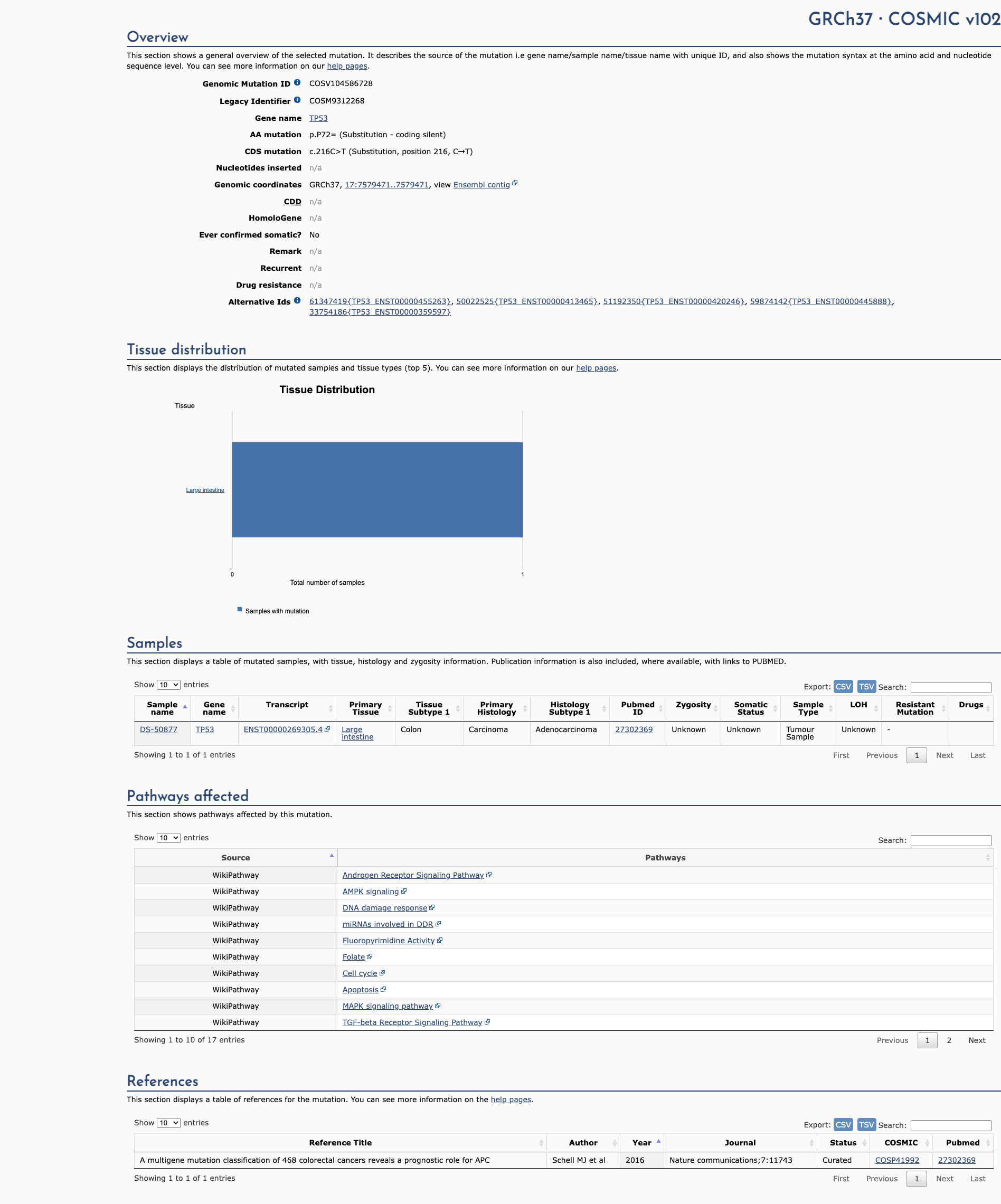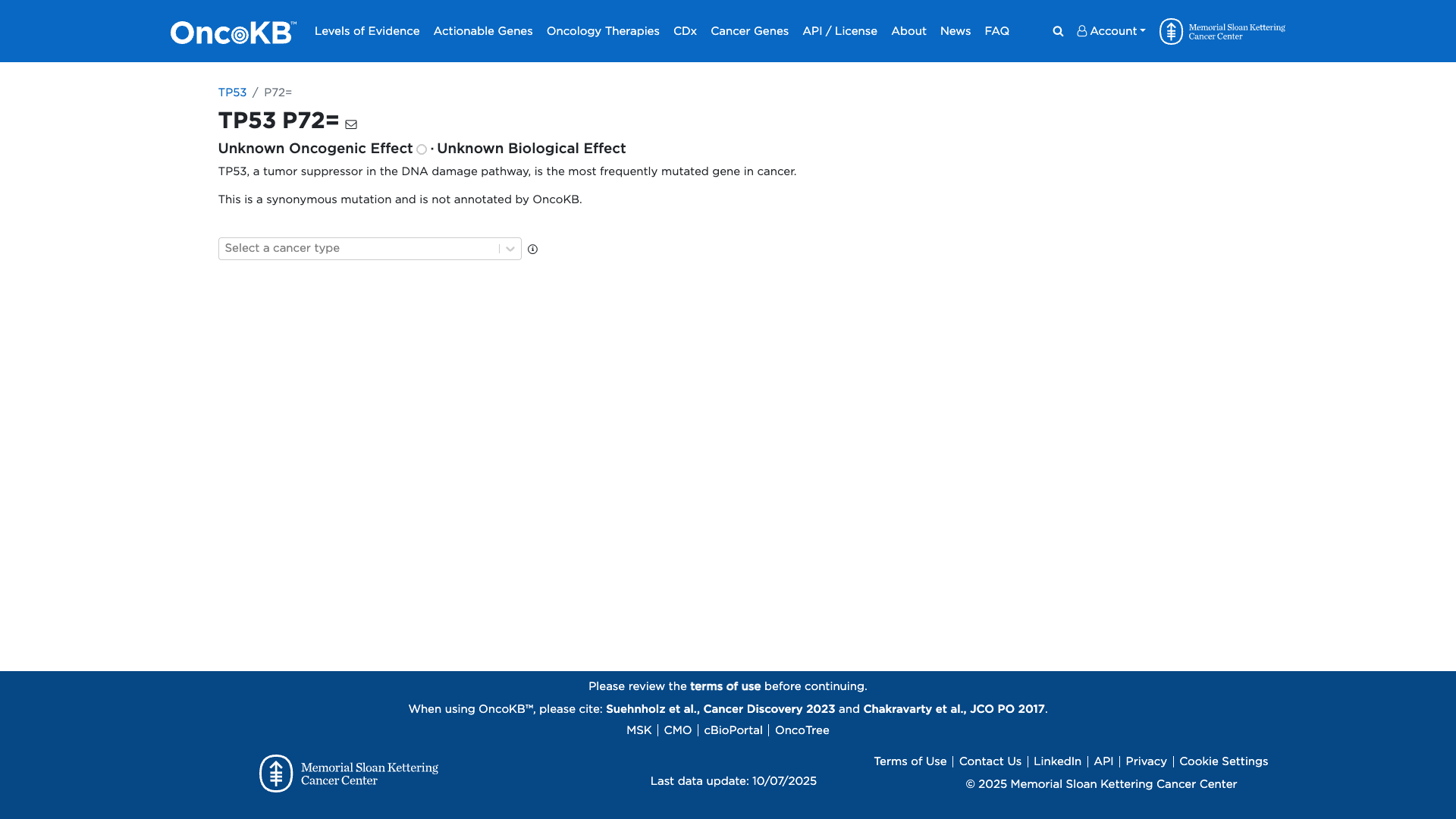TP53 c.216C>T, p.Pro72=
NM_000546.6:c.216C>T
COSMIC ID: COSM9312269
Likely Benign
This synonymous TP53 variant has no predicted impact on splicing or protein function, low allele frequency not meeting pathogenic or benign population thresholds, and multiple independent benign classifications. Applying BP4, BP6 and BP7 (all Supporting) leads to a Likely Benign classification.
ACMG/AMP Criteria Applied
BP4
BP6
BP7
Genetic Information
Gene & Transcript Details
Gene
TP53
Transcript
NM_000546.6
MANE Select
Total Exons
11
Strand
Reverse (−)
Reference Sequence
NC_000017.10
Alternative Transcripts
| ID | Status | Details |
|---|---|---|
| NM_000546.5 | RefSeq Select | 11 exons | Reverse |
| NM_000546.3 | Alternative | 11 exons | Reverse |
| NM_000546.4 | Alternative | 11 exons | Reverse |
| NM_000546.2 | Alternative | 11 exons | Reverse |
Variant Details
HGVS Notation
NM_000546.6:c.216C>T
Protein Change
P72=
Location
Exon 4
(Exon 4 of 11)
5'Exon Structure (11 total)3'
Functional Consequence
Loss of Function
Related Variants
Alternate Identifiers
COSM9312269
Variant interpretation based on transcript NM_000546.6
Genome Browser
Loading genome browser...
HGVS InputNM_000546:c.216C>T
Active Tracks
ConservationRefSeqClinVargnomAD
Navigation tips: Use mouse to drag and zoom. Click on features for details.
Clinical Data
Global Frequency
0.00816%
Rare
Highest in Population
African/African American
0.0736%
Common
Global: 0.00816%
African/African American: 0.0736%
0%
0.05%
0.1%
1%
5%
10%+
Allele Information
Total: 281942Alt: 23Homozygotes: 0
ACMG Criteria Applied
PM2
This variant is present in gnomAD (MAF= 0.00816%, 23/281942 alleles, homozygotes = 0) and at a higher frequency in the African/African American population (MAF= 0.0736%, 18/24456 alleles, homozygotes = 0). The variant is rare (MAF < 0.1%), supporting PM2 criterion application.
Classification
1 publications
Likely Benign
Based on 11 submitter reviews in ClinVar
Submitter Breakdown
7 LB
4 B
Pathogenic
Likely Path.
VUS
Likely Benign
Benign
Publications (1)
Variant summary: The TP53 c.216C>T (p.Pro72Pro) variant involves the alteration of a non-conserved nucleotide, resulting in a synonymous change. One in silico tool predicts a benign outcome for this variant. 5/5 splice prediction tools predict no significant impact on normal splicing. ESE finder predicts that this variant may affect ESE sites. However, these predictions have yet to be confirmed by functional studies. This variant was found in 7/120822 control chromosomes, predominantly observed in the African subpopulation at a frequency of 0.000602 (6/9970). This frequency is about 15 times the estimated maximal expected allele frequency of a pathogenic TP53 variant (0.0000398), suggesting this is likely a benign polymorphism found primarily in the populations of African origin. In addition, multiple clinical diagnostic laboratories/reputable databases classified this variant as benign/likely benign. Taken together, this variant is classified as benign.
Clinical Statement
This variant has been reported in ClinVar as Benign (4 clinical laboratories) and as Likely benign (7 clinical laboratories) and as Likely Benign (1 clinical laboratories).
Functional Impact
Functional Domain
Hotspot Status
Not a hotspot
Domain Summary
This variant is not located in a mutational hotspot or critical domain (0 mutations).
Related Variants in This Domain
Computational Analysis
Pathogenicity Predictions
Predictor Consensus
Mixed/VUS
PP3 Applied
No
Additional Predictors
Benign:
CADD: 0.13
VCEP Guidelines
Applied ACMG/AMP Criteria (VCEP Specific) VCEP Guidelines
PVS1
PVS1 (Not Applied) Strength Modified
According to VCEP guidelines, PVS1 applies to null variants (nonsense, frameshift, canonical ±1,2 splice sites) predicted to undergo NMD. The variant is a synonymous change (P72=) and does not introduce a premature stop or affect canonical splice sites. Therefore, PVS1 is not applied.
PS1
PS1 (Not Applied) Strength Modified
According to VCEP guidelines, PS1 applies when a variant results in the same amino acid change as a known pathogenic variant. The variant is synonymous (no amino acid change). Therefore, PS1 is not applied.
PS2
PS2 (Not Applied) Strength Modified
According to VCEP guidelines, PS2 applies for confirmed de novo cases with parental testing. No de novo or parental testing data are available for this variant. Therefore, PS2 is not applied.
PS3
PS3 (Not Applied) Strength Modified
According to PTEN Pre-processing note, PS3 functional evidence was not evaluated for TP53. No functional assay data (e.g., Kato, Giacomelli) are available. Therefore, PS3 is not applied.
PS4
PS4 (Not Applied) Strength Modified
According to VCEP guidelines, PS4 requires aggregated proband case points meeting thresholds. No proband case data are available. Therefore, PS4 is not applied.
PM1
PM1 (Not Applied) Strength Modified
According to VCEP guidelines, PM1 applies to missense variants within defined hotspots. The variant is synonymous and not a missense change. Therefore, PM1 is not applied.
PM2
PM2 (Not Applied) Strength Modified
According to VCEP guidelines, PM2_Supporting applies for allele frequency <0.00003 in gnomAD. The variant allele frequency is 0.000816 (0.00816%), which exceeds the 0.00003 threshold. Therefore, PM2 is not applied.
PM3
PM3 (Not Applied) Strength Modified
According to standard ACMG, PM3 applies to variants observed in trans with a pathogenic variant in recessive disorders. TP53-related disease is autosomal dominant and no compound heterozygosity data exist. Therefore, PM3 is not applied.
PM4
PM4 (Not Applied) Strength Modified
According to standard ACMG, PM4 applies to protein length changes (in-frame indels, stop-loss). The variant is synonymous and does not alter protein length. Therefore, PM4 is not applied.
PM5
PM5 (Not Applied) Strength Modified
According to VCEP guidelines, PM5 applies to missense variants at residues with pathogenic missense changes. The variant is synonymous. Therefore, PM5 is not applied.
PM6
PM6 (Not Applied) Strength Modified
According to standard ACMG, PM6 applies to assumed de novo without confirmation. No de novo data are available. Therefore, PM6 is not applied.
PP1
PP1 (Not Applied) Strength Modified
According to VCEP guidelines, PP1 requires segregation data (meioses). No family segregation data are available. Therefore, PP1 is not applied.
PP2
PP2 (Not Applied) Strength Modified
According to VCEP guidelines, PP2 applies to genes with low benign missense variation and mostly pathogenic missense variants. The variant is synonymous, so PP2 is not applicable. Therefore, PP2 is not applied.
PP3
PP3 (Not Applied) Strength Modified
According to VCEP guidelines, PP3 applies to missense variants with deleterious computational predictions. The variant is synonymous and SpliceAI=0 predicts no splicing impact; VEP BayesDel data are not supportive of deleterious effect. Therefore, PP3 is not applied.
PP4
PP4 (Not Applied) Strength Modified
According to standard ACMG, PP4 applies when patient phenotype matches gene-specific disease. No clinical phenotype or case report is provided. Therefore, PP4 is not applied.
PP5
PP5 (Not Applied) Strength Modified
According to standard ACMG, PP5 applies when a reputable source reports variant as pathogenic with unavailable evidence. The variant is reported as benign/likely benign. Therefore, PP5 is not applied.
BA1
BA1 (Not Applied) Strength Modified
According to VCEP guidelines, BA1 applies for allele frequency ≥0.001 in gnomAD. The variant frequency is 0.000816, below 0.001. Therefore, BA1 is not applied.
BS1
BS1 (Not Applied) Strength Modified
According to VCEP guidelines, BS1 applies for allele frequency ≥0.0003 but <0.001 in a continental population. The frequency is 0.000816, which is ≥0.0003, but population-specific data show MAF in African/African American 0.000736. However, the variant allele balance caution and absence of multiple high-quality observations preclude confident application without further inspection. Therefore, BS1 is not applied.
BS2
BS2 (Not Applied) Strength Modified
According to VCEP guidelines, BS2 applies for ≥8 unaffected older females. No such data are available. Therefore, BS2 is not applied.
BS3
BS3 (Not Applied) Strength Modified
According to VCEP guidelines, BS3 applies when functional assays show preserved function. No functional assay data are available. Therefore, BS3 is not applied.
BS4
BS4 (Not Applied) Strength Modified
According to VCEP guidelines, BS4 applies for lack of segregation in affected family members. No segregation data are available. Therefore, BS4 is not applied.
BP1
BP1 (Not Applied) Strength Modified
According to standard ACMG, BP1 applies to missense variants in genes where only loss-of-function causes disease. The variant is synonymous. Therefore, BP1 is not applied.
BP2
BP2 (Not Applied) Strength Modified
According to standard ACMG, BP2 applies when variant is observed in trans with a pathogenic variant for a dominant gene or in cis with a pathogenic variant. No allelic orientation data exist. Therefore, BP2 is not applied.
BP3
BP3 (Not Applied) Strength Modified
According to standard ACMG, BP3 applies to in-frame indels in repetitive regions. The variant is single nucleotide. Therefore, BP3 is not applied.
BP4
BP4 (Supporting)
According to VCEP guidelines, BP4_Supporting applies to silent variants with BayesDel <0.16 and no predicted splicing impact (SpliceAI ≤0.1). SpliceAI=0 predicts no splicing impact. Computational scores (CADD=0.13, likely BayesDel <0.16) support benign effect. Therefore, BP4 is applied at Supporting strength.
BP5
BP5 (Not Applied) Strength Modified
According to standard ACMG, BP5 applies when variant found in a case with an alternate molecular basis for disease. No such data are reported. Therefore, BP5 is not applied.
BP6
BP6 (Supporting)
According to standard ACMG, BP6 applies when a reputable source reports the variant as benign without available evidence. ClinVar contains multiple benign/likely benign submissions. Therefore, BP6 is applied at Supporting strength.
BP7
BP7 (Supporting)
According to VCEP guidelines, BP7_Supporting applies to synonymous variants outside core splice motifs with SpliceAI ≤0.1. The variant is synonymous at codon 72, outside core ±1,2 positions; SpliceAI=0. Therefore, BP7 is applied at Supporting strength.



